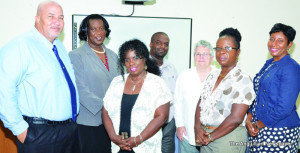Tuesday and Wednesday (September 1 and 2) saw a big public/private sector discussion in Anguilla, centred on “Building Effective Governance for Land Use Planning and Environmental Management Practices in Anguilla,” involving various stakeholders. It is a 2012 initiative of the former Government of Anguilla with funding by the Barbados-based Caribbean Development Bank.
As part of this project, the previous Government retained a Legal Consultant, Ms. Christine Toppin-Allahar; an institutional Specialist, Dr. Marilyn Morris; and a Public Awareness and Education Consultant, Mrs. Barbara Jacobs-Small. The project is now being continued, by the current Government of Anguilla, to develop an integrated system of legislation and regulations. Together, these measures will provide the legal and administrative framework for effective and coordinated land use planning and environmental conservation, protection and management in Anguilla.

Ms. Christine Toppin-Allahar, Mrs. Barbara Jacobs-Small and Mrs. Cora Richardson-Hodge
The Anguillian newspaper spoke to Dr. Marilyn Morris, one of the consultants, and Mr. Kenneth Hodge, Principal Assistant Secretary in the Ministry of Home Affairs in Anguilla.
Dr. Morris explained: “The project is all about ensuring that there is participatory planning in what we do, and it is open to discussion with various groups – private sector interest groups and associations such as the Chamber of Commerce, the Hotel and Tourism Association, landowners, land and community-based interests, sector development interests such as tourism, the dive and water sports sector, and a whole range of public enterprises that have to do with the use and management of land, and environment integrity.”
Questioned further, she said: “At the end of it, we want to ensure that we have a proper governance structure in place. Where the legislation is existing, but obsolete, or need updating, this is why we are here. We are looking at more comprehensive legislation to manage land, develop land, and the environment as well.”
Mr. Morris continued: “Hopefully, it will be something that can be implemented so that Anguillians become good stewards of their land, the development of their land; and the development thrust for their land and country in general. We are a small island state here and we are faced with a lot of environmental issues as they relate to climate change and the adaptation for climate change. This island is so unique because it has a large central valley system. And so its venerability is heightened with respect to the whole issue of climate change, storm surges and hurricanes. So it is important that government and people work together for sustainable development in Anguilla and that’s why we are actually here.”
Mr. Kenneth Hodge, speaking on behalf of the Ministry of Home Affairs, has responsibility for land and the environment. He commented as follows:
“It is a needed project for Anguilla. I think it is time that we bring ourselves into the modern era of development. We have the consultants here meeting with the various stakeholders to obtain their ideas that would translate in more modern legislation for Anguilla. I can only hope that Anguillians will embrace this process, fully participate and make it a success.”
Mr. Hodge added: “We are looking at things like land use planning and environmental protection aimed at putting modern policies in place that would help us as a country to regulate and guide our development process. I think in many cases we have not been able to embrace the latest technologies, and so this process is helping us to come into the modern age of development.”
Meanwhile a press release, issued earlier by the Ministry of Home Affairs, stated that in order to achieve its objectives, the project is focused on the following:
“Harmonising key pieces of legislation to ensure a more streamlined physical planning, environmental permitting and licensing system; designing administrative mechanisms and procedures that will facilitate increased coordination between key environmental agencies and departments in the decision-making process, monitoring and enforcement; providing a legislative basis for the use of best practice decision-making tools such as Environmental Impact Assessments (EIA’s) and Strategic EIAs, climate and disaster risk assessment tools; and designing a governance framework that is more accountable, transparent, and inclusive, with widened participatory processes for decision-making and in the management of natural resources and taking into account the Anguillian social ethos.
The release concluded: “The main objectives are to revise the Draft Bill for the Environmental Protection Act and the Draft Bill for the Physical Planning Act. In addition, the regulations for both Bills will be drafted and/or amended. The regulations for the Biodiversity and Heritage Conservation Act 2009 will also be developed.”







